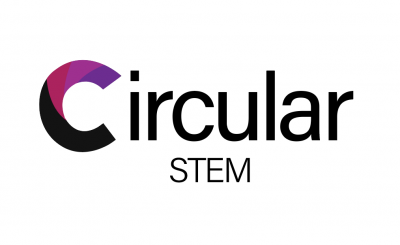CIRCULAR ECONOMY is based on three principles: eliminate waste, reintroduction of products and materials in the production loop so that nature can regenerate. As the CIRCULAR ECONOMY is also a transversal subject dealing with a lot of topics included in the school curriculum, STEM plays an important role in supporting the transition to CIRCULAR ECONOMY. The EU has adopted a Circular Economy Action Plan to help achieve this transition and achieve the Green Deal objectives.
These above-mentioned elements constitute the project’s backbone idea that was launched in September 2022. This Erasmus+ KA2 Strategic partnership project entitled “Circular STEM” aims to provide STEM teachers’ with competences to introduce education about circular economy at school by integrating it with STEM subjects, developing an interdisciplinary methodology that makes clear links between circular economy concepts and school subjects. The methodology will transversally cover digital and entrepreneurial skills, with a special attention to raise girls’ interest in STEM, because of the existing gender gap in the sector. Furthermore, the project has an underlying approach focusing on empowering girls in using digital tools and raising their interest in STEM subjects.
The project consortium consists of the following organisations:
– Agrupamento de Escolas de Frazão, Paços de Ferreira from Portugal
– EUROPEAN DIGITAL LEARNING NETWORK ETS from Italy
– Institut za moderno obrazovanje from Serbia
– POLITEKNIKA IKASTEGIA TXORIERRI S.COOP from Spain
– EKONOMIKAS UN KULTURAS AUGSTSKOLA from Latvia
– EIT RawMaterials GmbH from Germany
During its lifetime (24 months in total), the partners will be involved in the development of the following results:
- Training methodology to develop lesson plans on STEM subjects introducing circular economy, digital and entrepreneurial competences based on a learner-centred approach to stimulate them to actively participate in the classroom activities, also making use of digital tools.
- Training Contents developed based on real-world challenges, consolidated through the piloting activities organised by the partner schools.
- CIRCULAR STEM Academy, a E-learning platform hosting all project results.
- Toolbox made of additional online and offline resources to support the methodology and the training contents.
The project and its activities are mainly addressed to:
- Secondary school STEM teachers – the project will have an impact of the Continuous Professional Development of teachers and enable them to take a more active role in promoting education about the circular economy, adopting innovative digital tools for their lessons and promoting the entrepreneurial spirit of students.
- School Principals – School principals must be involved and informed about available tools to integrate circular economy into the school curriculum, enabling secondary school students to adopt forward-looking skills that can contribute to the transition to a low-carbon economy.
- Secondary school students aged 13 to 18 (indirect target group) – the global youth movements rising in the past few years have shown how young people are concerned about environmental issues and are willing to take action to make a difference; the results produced by the projects will be used for this target group.
- Students’ parents and families – by having an impact on students, the project will also reach their families.
Stay up to date on the project online:
Visit the website: http://circularstem.eu/
Follow the project activities on
- Facebook: CircularSTEM
- Linkedin: CircularSTEM
